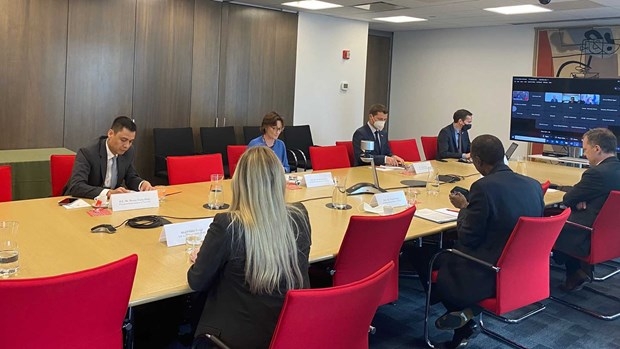
Vietnamese Ambassador Dang Hoang Giang (first, left) at the online debate on May 24. (Photo: VNA)
The debate, held in coordination with the Swiss, Senegalese and Slovenian missions, UNICEF, the International Committee of the Red Cross, and the Peace Organisation (PAX), was part of the UN’s Protection of Civilians Week 2022.
Addressing the event, Ambassador Dang Hoang Giang, Permanent Representative of Vietnam to the UN, affirmed the country’s viewpoint that water security is a foundation of peace, stability and development for every country and community.
He expressed Vietnam’s concern about the humanitarian impacts and difficulties caused by the destruction of water sources and water supply infrastructure in armed conflicts in many places around the world, including Africa and the Middle East, that have made many people homeless and triggered migration and public health crises.
In April 2021, when Vietnam held the presidency of the UN Security Council (UNSC), the council adopted Resolution 2573 on the protection of objects indispensable to the survival of the civilian population, including water supply systems.
This resolution was co-sponsored by 64 UN member states, including all the 15 UNSC members, thereby affirming the UNSC’s strong commitment to protecting civilians and promoting compliance with international humanitarian law, Giang noted.
The diplomat appealed to all parties concerned to improve awareness and promote the implementation of obligations under international humanitarian law. He also recommended the UNSC work out more concrete solutions to challenges posed by water security loss.
At the debate, participants shared the concern over serious consequences of the destruction or contamination of water sources in armed conflicts, along with this issue’s adverse impacts on the living environment and life of civilians, including vulnerable groups like women and children. This problem has been reported in many conflict-affected areas around the world, from the Middle East to North Africa.
Representatives of many countries and organisations also highly valued the UNSC’s Resolution 2573, calling for enhanced observance of related obligations under international humanitarian law and for the UNSC’s further engagement in this issue.

Comment
Print